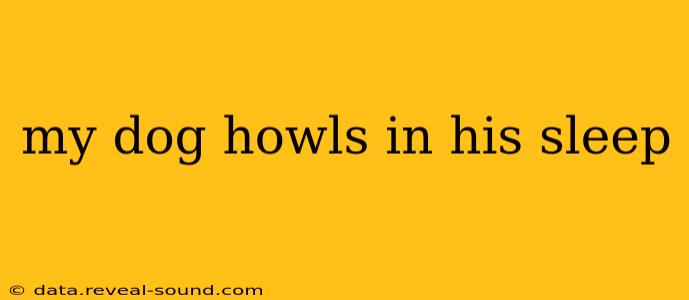Many dog owners have experienced the slightly unsettling, yet often endearing, sound of their canine companion howling in their sleep. While it might seem alarming at first, this behavior is usually harmless and often reflects the fascinating world of canine dreams. This comprehensive guide will explore the reasons behind sleep howling in dogs, offering insights into the science behind it and providing advice on how to best address any concerns.
Why Does My Dog Howl in His Sleep?
The most common reason for sleep howling is simply dreaming. Just like humans, dogs experience REM (Rapid Eye Movement) sleep, the stage associated with vivid dreams. During REM sleep, dogs may exhibit various behaviors, including whimpering, twitching, paddling their legs, and yes, even howling. These actions are believed to be physical manifestations of the dream scenarios playing out in their minds. The content of these dreams is, of course, unknown to us, but they likely reflect experiences from their waking hours – playing fetch, chasing squirrels, or interacting with their family.
Is It Normal for Dogs to Howl in Their Sleep?
Yes, sleep howling in dogs is generally considered a normal behavior, particularly in younger, more active dogs. However, the frequency and intensity of the howling can vary between individuals. Some dogs might only do it occasionally, while others might howl more frequently. If the howling is excessive, accompanied by other unusual behaviors, or seems to be causing your dog distress, consulting a veterinarian is always recommended.
What if my dog howls excessively or seems distressed?
Excessive howling, especially if coupled with restlessness, panting, or other unusual behaviors, could warrant veterinary attention. Underlying medical conditions, such as pain, discomfort, or neurological issues, could contribute to disrupted sleep and vocalizations. Your vet can perform a thorough examination to rule out any potential health problems.
Could it be a sign of a medical problem?
While sleep howling is often benign, it's crucial to consider the context. If the howling is a new behavior, significantly more frequent than usual, or accompanied by other symptoms like changes in appetite, lethargy, or unusual urination/defecation, a veterinary check-up is necessary. These could be indicators of underlying medical conditions requiring professional attention.
Are certain breeds more prone to sleep howling?
While no breed is specifically predisposed to sleep howling, certain breeds known for their vocal nature might exhibit this behavior more prominently. Breeds often used for herding or guarding, for example, might vocalize more frequently in their sleep, reflecting their inherent tendencies. However, this is not a definitive factor, and many quiet breeds also experience sleep howling.
Should I wake my dog if he's howling in his sleep?
Generally, it's not necessary to wake your dog unless the howling is excessively loud or seems to be causing him distress. Interrupting REM sleep can be disruptive and might not be beneficial. Observe your dog's behavior and consult your vet if you have any concerns.
How can I help my dog sleep better and reduce sleep howling?
Creating a calm and comfortable sleep environment can help reduce sleep disturbances. Ensure your dog has a comfortable bed, a quiet sleeping area, and a consistent bedtime routine. A tired dog is a well-behaved dog, so make sure they get plenty of exercise and mental stimulation throughout the day.
Conclusion: Understanding and Addressing Sleep Howling
Understanding that sleep howling is often a natural manifestation of canine dreaming can ease concerns. However, maintaining awareness of your dog's overall health and behavior is paramount. By monitoring for any unusual changes and consulting a veterinarian when necessary, you can ensure your furry friend's well-being and address any underlying issues promptly. Remember, a healthy and happy dog usually translates to peaceful, if sometimes slightly noisy, sleep!
